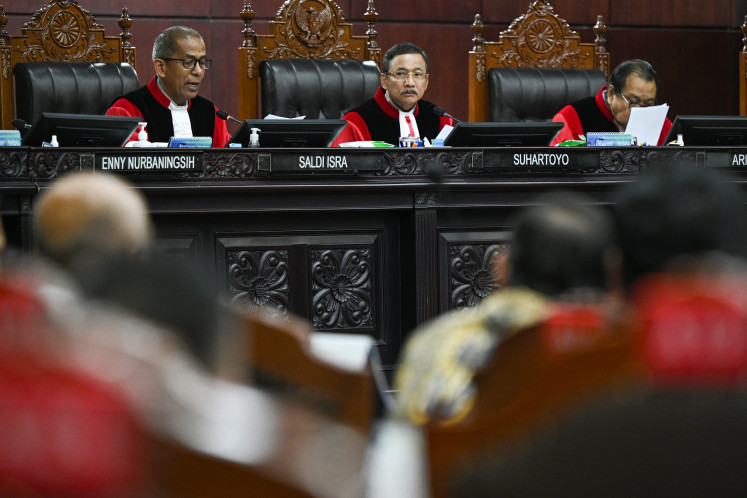Popular Reads
Top Results
Can't find what you're looking for?
View all search resultsPopular Reads
Top Results
Can't find what you're looking for?
View all search resultsRCEP not China-led initiative: ASEAN secretary-general
ASEAN Secretary-General Lim Jock Hoi rejected on Thursday mischaracterizations of the Regional Comprehensive Economic Partnership (RCEP), a landmark trade deal encompassing most of the Asia-Pacific, arguing that it has always been an ASEAN-led effort and not a China-backed initiative
Change text size
Gift Premium Articles
to Anyone
A
SEAN Secretary-General Lim Jock Hoi rejected on Thursday mischaracterizations of the Regional Comprehensive Economic Partnership (RCEP), a landmark trade deal encompassing most of the Asia-Pacific, arguing that it has always been an ASEAN-led effort and not a China-backed initiative.
At the Third RCEP Summit earlier this week, held in Bangkok as part of a series of meetings under the banner of the ASEAN Summit, the leaders of 15 countries announced they had concluded text-based negotiations of the trade pact, but left the door open for India to resolve domestic issues that had led it to pull out of the deal.
“This [agreement] was mooted by ASEAN. ASEAN put this forward and [it was] agreed by everyone, and following that we started negotiations in 2013 in Brunei,” Lim told journalists in a briefing in Jakarta on Thursday. “It was very much coordinated and led by Indonesia,” he added.
The idea was first floated as a trade agreement under the ASEAN Plus Three mechanism, which serves as a cooperation platform for ASEAN, China, Japan and South Korea, but was later expanded to include other dialogue partners India, Australia and New Zealand.
“ASEAN has an FTA [free trade agreement] with each of the dialogue partners, [so] we thought it was good to put them together under one big umbrella to enhance trade and investment in the region,” he explained.
Initiated in 2012, the RCEP includes all 10 ASEAN member states and its six dialogue partners. The 16 countries represent 3.4 billion people and a combined gross domestic product (GDP) of about one third of the world, making the RCEP a highly strategic agreement for its members.
However, disagreements between regional rivals, mainly between China and India over access to India’s giant consumer market, hampered negotiations up until the last minute on Monday, which prompted India to withdraw from the pact.
“This [agreement] was mooted by ASEAN. ASEAN put this forward and [it was] agreed by everyone, and following that we started negotiations in 2013 in Brunei.”
With the prolonged trade war between the United States and China causing a slowdown in the global economy, the multilateral trade agreement has been projected to enhance economic growth and market access for participating countries.
However, with China being the biggest economy in the grouping, critics feared it would dominate the market.
“Of course Western newspapers always say that it is China-led because China is a big country, which is part of the RCEP, so we don’t dispute that. But again, the initiative is ASEAN’s,” he said.
“ASEAN is central to the negotiations of the FTA; […] just because there's a big economy there, [the assumption is] it will take the lead. But no, we are the ones who are taking the lead.”
According to the former Brunei diplomat, the US had never been a part of the RCEP because it had the Trans-Pacific Partnership (TPP), which it initiated but then withdrew from in 2017.
However, Lim said he hoped there would be an eventual merger between the RCEP and the TPP as part of the wider Asia-Pacific Economic Community (APEC) cooperation framework.
“We are talking about the bigger picture here in APEC, so that the RCEP [and] the TPP will emerge as one of the big umbrella FTAs within the APEC region,” he said.
Even without India’s population of 1.3 billion, the RCEP still makes up around 30 percent of the world’s GDP and trade flows. It would still be the world’s biggest trading bloc, Lim said.
“It will be bigger than the TPP. We have over 2 billion people with a GDP of 27 percent and 29 percent of total trade — even bigger than the EU [European Union] and North America,” he said.
Lim said the leaders of the 15 countries were determined to sign the finished agreement at next November’s summit in Vietnam. “There are very few items left that we will be discussing in the next few months,” he added.
Addressing the conundrum of India’s participation, the secretary-general said ASEAN would be working with India to address its core difficulties.
”We will try to work together to address the issues; we leave it to India to come back to us so that we will be able to have 16 countries [sign the pact] — if the time permits.”










